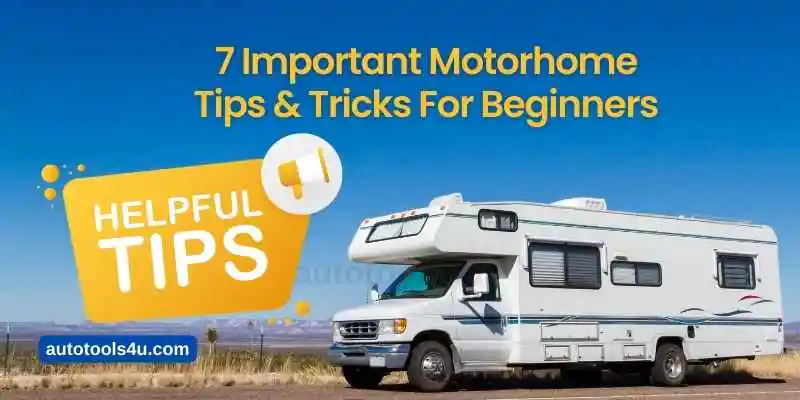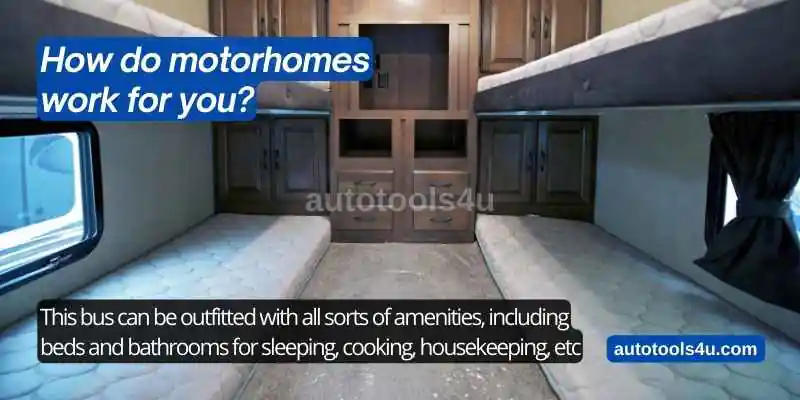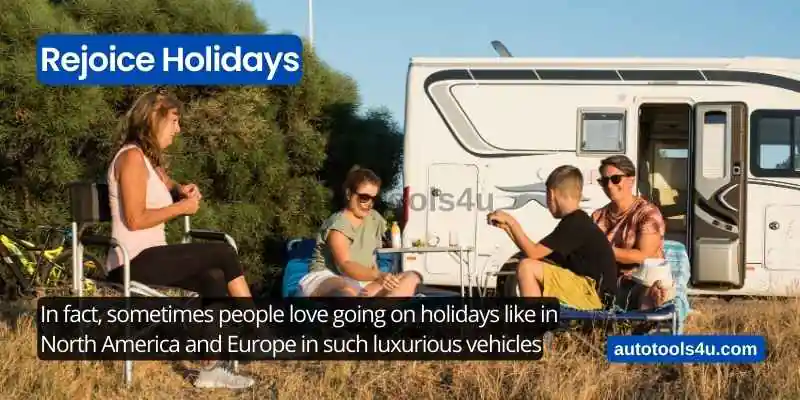Planning a motorhome road trip is an exciting adventure that allows you to explore new places and enjoy the freedom of the open road. However, before you hit the highway, it’s important to take a few essential steps to ensure that your trip is safe and stress-free. In this article, we’ll be sharing ten essential motorhome tips that will help you prepare for your journey and make the most of your time on the road. From checking your vehicle’s mechanical systems to packing the right gear and planning your route, these tips are designed to help you stay safe and comfortable throughout your trip. So whether you’re a seasoned motorhome enthusiast or just starting out, read on to discover our top tips for a successful and enjoyable road trip experience.
How do motorhomes work for you?
A motorhome is a vehicle that has a living space, sleeping accommodation, and extra storage. It is often used for recreational purposes and camping (The Oxford English Dictionary). It has been designed to carry people and their personal belongings while they are traveling in an RV.
The popularity of the motorhome has grown in the last few decades with the increasing need for people to explore different places on their holidays. This has led to different types of motorhomes on the market, such as Bikes, Campervans, Caravans, and RVs. In fact, people love going on holidays in comfortable and if possible luxurious vehicles. Nothing can be better than this shelter as it gives freedom and comfort that can’t be experienced anywhere else.
You can make it your home, and decorate the interior in any design that you like with appliances – ovens, microwaves, hotplates, etc. Not only that, it has a built-in power supply and heating to keep people warm during the winter, as well as being light enough to allow it to be easily transported.
This bus can be outfitted with all sorts of amenities, including beds and bathrooms for sleeping, cooking, housekeeping, etc. There are also some special-purpose models that come with specific interior specifications. This type of vehicle can be any model-from basic caravan to large luxury vehicles.
Importance of Planning Ahead
Planning ahead is essential when it comes to a motorhome road trip. You need to have a clear idea of your destination, the route you’ll be taking, and the sights you want to see along the way. This will help you avoid unexpected detours and ensure that you have enough time to see everything on your itinerary.
One of the first things you should do is research the area you’ll be visiting. Look for campgrounds, RV parks, and other accommodations along your route. Check for any fees or restrictions, and make reservations ahead of time if possible.
Another important aspect of planning ahead is creating a checklist of things you need to bring with you. This includes essential items such as your driver’s license, registration, and insurance papers, as well as personal items like clothing, toiletries, and medications. Don’t forget to also pack any tools or equipment you may need for minor repairs or maintenance on your motorhome.
Choosing the Right Motorhome Rental
Choosing the right motorhome rental is critical to having a safe and comfortable road trip. You want to make sure that the vehicle you rent is suitable for your needs and has all the necessary amenities. Before you choose a motorhome rental, consider the size and layout of the vehicle. Think about how many people will be traveling with you and how much space you’ll need for sleeping, cooking, and relaxing. Make sure the motorhome has a bathroom, shower, and kitchen facilities, as well as heating and air conditioning.
When renting a motorhome, it’s also important to check the rental company’s policies and procedures. Make sure you understand the terms of the rental agreement and any fees or penalties for damage or late returns. You should also ask about roadside assistance and what to do in case of an emergency.
Packing Essentials for a Motorhome Trip
Packing for a motorhome trip requires some careful planning to make sure you have everything you need without overloading your vehicle. You want to pack efficiently and prioritize the essentials. One of the most important things to pack is food and cooking supplies. Bring non-perishable items, such as canned goods, pasta, and rice, as well as cooking utensils, pots, and pans. Don’t forget to also pack a cooler and ice for perishable items like meat, dairy, and produce.
Other essential items to pack include bedding, towels, and toiletries. Bring clothing suitable for the weather and activities you’ll be doing along your route. You may also want to bring entertainment options like books, games, or a portable DVD player.
Use A GPS Navigator
The motorhome industry is witnessing a steep rise in the demand for GPS navigators as people are increasingly looking at becoming motorhome owners. GPS provides you with the simplicity of following your destination and updates you with maps, satellite imagery, and traffic conditions.
If you own a motorhome or RV, it’s important to have a GPS navigator for the best experience. GPS navigators are vital tools that help people avoid getting lost.
Be mindful of these easy tips when using GPS for navigation:
- Do not rely on GPS exclusively at night. You need to know your route, especially if you have been driving for a long time.
- When you pull out of the driveway, make sure that you know where it is and what your destination is because there will be no street signs or landmarks until very late in the woods/mountains/countryside.
- If you are navigating around unfamiliar places, keep your phone on airplane mode or turn off Bluetooth so that it won’t ping.
Use 2 Led Lights At Night-Time
Generally, the headlights of an automobile are always on during the daytime. The only time they are off is when you turn them off at night. If you are a motorhome owner and have trouble turning on your headlights, then keep reading.
Many people don’t know that there are actually two LED lights-one in front and one in back-that is switched on when the motorhome is not moving. These lights can be turned on by pressing a button near the steering wheel or with a dashboard switch for two seconds before their ignition keys start the engine.
One of the most important things to remember about motorhome safety is to remember the following:
- Keep your headlights on at all times.
- Never drive under any bridge, overpass, or tunnel.
- The lighter you have during night driving the better.
- Keep yourself safe from potential accidents by turning on two LED lights
When it comes to picking out a truck, you should prioritize safety and get the most value for your money. Ask yourself if the amount of cash you are putting down is worth it for the extra safety features that come with this model. That being said, top-quality models such as those from GMC, Ford, and Ram will give you complete peace of mind when navigating during the nighttime.
Examine The Windows & Roof Vents 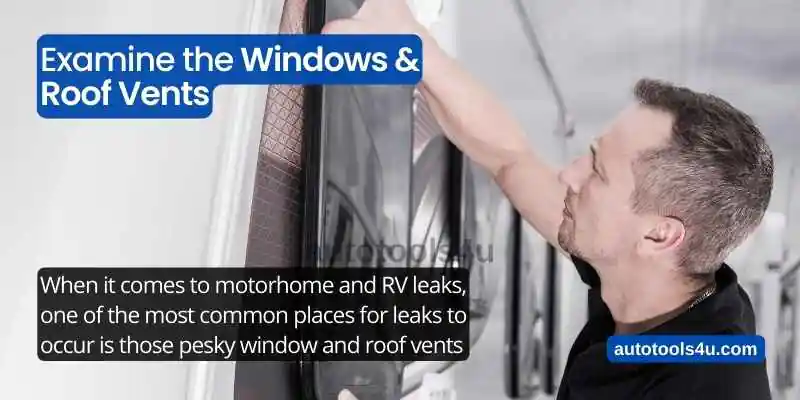
When it comes to motorhome and RV leaks, one of the most common places for leaks to occur is those pesky window and roof vents. If you want to ensure that your windows and roof vents are not leaking, check on them often.
There are many reasons why air can leak into or out of a motorhome or RV. The most common ones include:
- A loose or failed vent itself.
- Loose gaskets on the window or roof vent.
- Poor sealant around the window or roof vent.
If you notice that your window or roof vent is leaking during a bad storm, it may be time to replace it with a new one. For people who are just getting into RV life, this can be a tricky process. Here are the basic steps to ensure that you’re doing everything correctly. This will also help you avoid any potential problems with your RV.
- As with most things in life, there is no perfect way of doing things so it’s best to learn how to do these before you start living in your motorhome full-time!
- Newer motorhomes typically have roof and window vents built into them, but older trailers may not have this feature.
- In any case, it’s important to check that they are properly sealed.
- To do this, open up the window or vent and then shake the trailer-if any air escapes from around the sealant, then it needs replacing!
Place Paper Towels Between The Plates
To ensure your plates are not contaminated with bacteria after each meal, follow these steps:
- Use paper towels in place of dishcloths to wipe your plates clean.
- If you don’t have a microwave, you can put them in hot water for a few minutes.
- Always keep a few plates on hand so that you always have one within reach when you need it.
- Having plates around also saves time by reducing the number of trips needed to wash dishes after a meal is finished.
By keeping an eye on your plate, you too can ensure these items are within reach at all times!
Tips for Driving a Motorhome Safely
Driving a motorhome is a unique experience that requires some extra precautions to ensure your safety and the safety of others on the road. Here are some tips for driving a motorhome safely:
– Adjust your mirrors properly to eliminate blind spots.
– Allow for extra braking distance and avoid sudden stops or turns.
– Stay in the right-hand lane and use the left lane only for passing.
– Watch out for low bridges, narrow roads, and sharp turns.
– Slow down in windy conditions and pull over if necessary.
– Always wear your seatbelt and require all passengers to do the same.
Secure Your Internet Connection
Encrypting your internet connection is a great way to keep your sensitive data safe, and it’s great for the privacy of your family, friends, and employees. Companies are becoming more aware of data security and the risks associated with it. They are hoping that by encrypting their internet connections, they can protect their users’ personal information from hackers.
Hackers might also be spying on you when they see that you have an encrypted connection and know what kind of activities you tend to engage in online. Your Internet connection is like your car.
It’s important to protect it from hackers and other threats. Just like you would change your oil, you should change your Internet connection on a regular basis with a new password and update the security settings for your device to protect yourself from hackers.
Campsite Protocols and Parking Tips
When you arrive at a campsite or RV park, it’s important to follow proper etiquette and parking procedures to ensure a smooth and enjoyable experience for everyone. First, be respectful of other campers and keep noise levels to a minimum, especially at night. Follow any posted rules or regulations, such as quiet hours or designated parking areas. When parking your motorhome, choose a level and stable spot that’s away from hazards like trees or power lines. Use leveling blocks or pads if necessary to ensure a stable foundation.
Be Aware Of Your RV Dimensions
Know the height, breadth, and length of your motorhome. You need to be aware of your length because certain campsites only accept vans of a specific length if you don’t want to get stranded under any bridges. When temporary lanes are used during road construction in various European nations, signage next to the road indicates the lane width.
Another piece of helpful RV advice is that the slow lane is typically bigger because it has to make room for wide vehicles and lorries. Given the increased width you must navigate, this is an excellent lane for motorhomes. You must also specify the length of your RV when purchasing a ticket if you plan to travel by ferry.
Weight Limits For RV 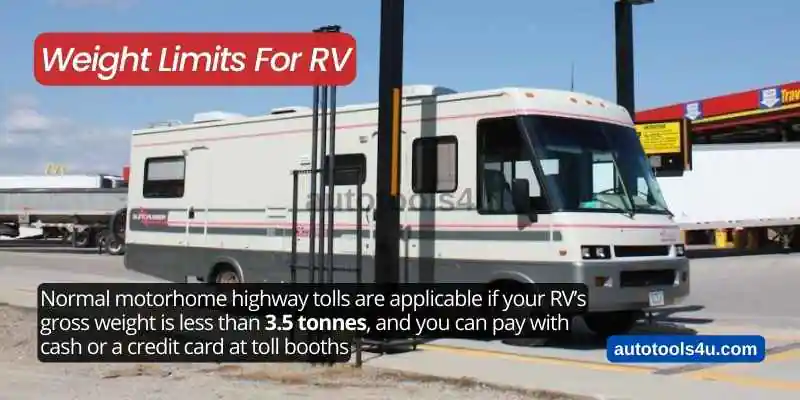
Normal motorhome highway tolls are applicable if your RV’s gross weight is less than 3.5 tonnes, and you can pay with cash or a credit card at toll booths.
As an alternative, the nation can demand that you buy a vignette, which is a sticker applied to the windscreen. When you make the purchase, you can choose how long the vignette will be valid. Since it’s easy to forget the expiration date, we recommend setting a phone reminder.
It will be necessary for you to register for an electronic tag or box that is maintained within the vehicle if your motorhome weighs more than 3.5 tonnes (this weight restriction applies to the majority of EU nations) and information on country-specific tolls.
Conclusion and Final Thoughts
A motorhome road trip can be an amazing adventure, but it requires some careful planning and preparation to ensure a safe and stress-free experience. By following these ten essential tips, you can prepare for your journey, stay safe on the road, and make the most of your time exploring new places and enjoying the freedom of the open road. So pack your bags, buckle up, and get ready for an unforgettable motorhome road trip!
FAQ – MotorHome Tips and Tricks
What is Caravan or trailer snaking and how to avoid it?
Caravan or trailer snaking is a term used to describe the side-to-side movement of a caravan or trailer being towed by a vehicle. This movement can be caused by a variety of factors, including high speeds, crosswinds, uneven weight distribution, or incorrect hitch setup. Make sure that your caravan or trailer is loaded correctly, with the weight evenly distributed throughout. This will help to prevent the trailer from swaying side-to-side. Ensure that the hitch is installed correctly and that it is compatible with your tow vehicle. The hitch should be level, and the coupling should be properly secured. High speeds increase the risk of caravan snaking, so drive at a moderate speed and avoid sudden movements or sharp turns.
- Drive smoothly and steadily, and avoid sudden braking or acceleration. Use your mirrors to monitor the movement of the caravan or trailer and adjust your speed accordingly.
- If you frequently tow a caravan or trailer, consider investing in a sway control system. This can help to reduce the risk of caravan snaking and improve overall stability on the road.
What is the most important safety tip for Caravan or Motorhomes?
One of the most important safety tips for caravans and motorhomes is to regularly maintain and inspect your vehicle to ensure that it is in good condition and safe to drive. This includes checking the brakes, tires, suspension, lights, and other critical components before each trip. Additionally, it is important to always drive at a safe and appropriate speed for road conditions and to adjust your driving style for the size and weight of your vehicle. Be aware of the height and width of your caravan or motorhome, and take care when navigating narrow or winding roads, low bridges, or other potential hazards. Finally, always be prepared for emergencies by carrying appropriate safety equipment, such as a fire extinguisher, first aid kit, and emergency supplies.
What are the most important things to check before setting out on MotorHome or Caravan journey?
- Check all of the exterior lights on the vehicle and trailer, including the headlights, brake lights, turn signals, and hazard lights.
- Check all of the vehicle’s fluid levels, including engine oil, coolant, brake fluid, and transmission fluid.
- Check the tire pressure and ensure that they are in good condition
- Check the brakes to ensure that they are working correctly and that the brake pads or shoes are not worn.
- Check the propane gas levels and make sure that the connections are secure.
- Fill the fresh water tank and check the plumbing connections for leaks.
- Check that all safety equipment, such as fire extinguishers, smoke detectors, and carbon monoxide detectors, are in good working order.
- Make sure that the weight of the load is distributed evenly throughout the vehicle and trailer, and that it is within the manufacturer’s recommended limits.
